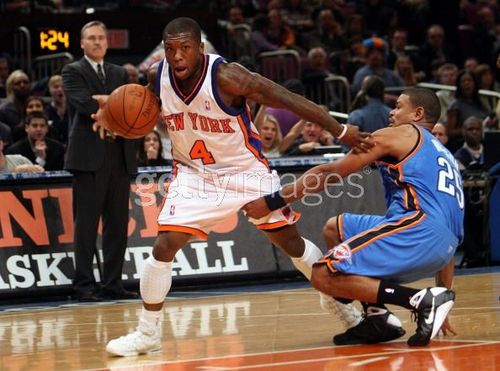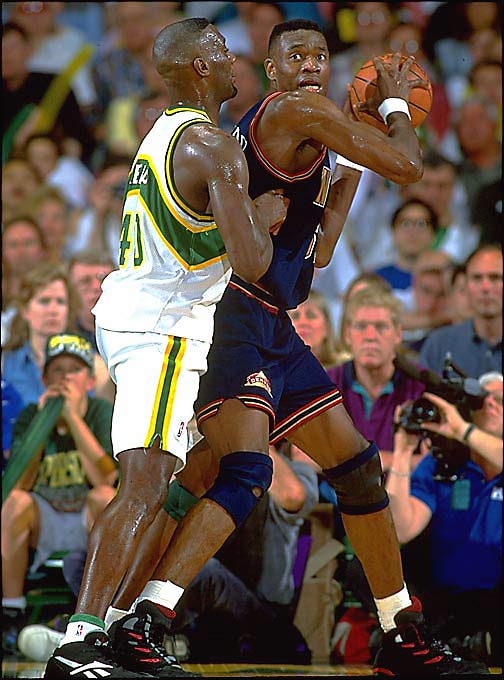It’s a little absurd, when you think about it. We’re experiencing the full spectrum of the human psyche, whilst watching grown men throw, kick or bat a piece of leather around an oblong of grass or hardwood. Or is it?
The unique passion and set of emotional fluctuations that your garden variety sports fan experiences in the course of a season are almost unparalleled in other areas of life. What are these emotions and how do they arise — with particular focus on basketball?
/heart-rushing excitement
 Imagine; you’re watching the Knicks play. You’re a long-suffering fan, expecting little above mediocrity every time the men in orange and blue take the court. Then, as an otherwise muddling mid-January game is about to put you to sleep, Nate Robinson flies out of nowhere to dunk over say, Dwight Howard. How do you feel now? With your heart racing, you jump out of you seat and exclaim in a heart-curdling cry! “Kryptonate!! Woooo!!”
Imagine; you’re watching the Knicks play. You’re a long-suffering fan, expecting little above mediocrity every time the men in orange and blue take the court. Then, as an otherwise muddling mid-January game is about to put you to sleep, Nate Robinson flies out of nowhere to dunk over say, Dwight Howard. How do you feel now? With your heart racing, you jump out of you seat and exclaim in a heart-curdling cry! “Kryptonate!! Woooo!!”
That pendulum swing from semi-drowsy to a heart-rate resembling an Olympic sprinter is not necessarily unique, but for many people, they do not experience those feelings anywhere else in their otherwise mundane/stable lives. Your ticket to the basketball game, or your expensive cable television subscription, becomes your passport to a world of dreams and escapism.
As you are watching Lil’ Nate next time down the court, you have a small amount of hope, a glimmer of optimism, that he will do it again. You might even start to imagine yourself in his Nikes, flying to the hoop and slamming one home. Where do the vast majority of people encounter that level of escapism in their normal 9-to-5 jobs? Basketball delivers that.
/belonging
As a fan, you become part of a fraternity, a brotherhood of sorts. You know that you have thousands, millions, (or hundreds if you’re a Grizzlies fan) of fellow human beings that are experiencing the same rollercoaster of fortunes. Whilst watching your team push for a playoff spot in April, you can feel the suspense build-up amongst co-workers and people walking down the street. They too are garnering a certain feeling of excitement and anticipation from watching their, no, your team drive for that playoff spot.
People take on a certain venacular when talking about sporting teams, in a way which differs from the way they may talk about the company they work for. They tend to use words like “us” and “we” when describing the way their squad is faring, despite the strongly apparent fact that they are not a paid member or employee of the organisation. On the contrary, these people are handing over their hard-earned pesos to support their team. They’re buying merchandise, shelling out for tickets, choosing cable companies based on their basketball schedule and traveling to away games.
Why do they do all of this? They do it so that they can share the sense of achievement when their team wins. They do it so that they can join in the hoops conversations with the other guys down at the local sports bar. They do it to form some sense of identity — “I’m a Lakers fan. Yeah, that’s right, Kobe is my boy. I’m cocky, but I’m a winner. What have you got to say about that?”
/childhood memories
Many sports fans start their love from a very young age. The other kids in the playground support the Chicago Bulls, so you want to be Michael Jordan too. Your dad takes you to see the Hornets play as a kid and you want to be that little Muggsy Bogues guy, who surely is shorter than you are (or so you think) and one day make it to the NBA. You watch Hakeem the Dream guide your Rockets to back-to-back titles and you’re hooked on that eurphoric feeling of victory and remember it for life.
As your life goes on, you want to replicate that feeling. Watching basketball brings back those wonderful, magical tingles that you got as a kid and you’re sure that if you keep on following your team, you’ll feel it all over again. For those two hours that you’re at the game, you are a kid again, with hopes, dreams and not a care in the world outside of that hardwood. Once again, it’s escapism at its strongest.
/technical precision
Perhaps you’re a purist for the game and really love to focus on the technical execution of an offensive play, or zero-in on the way a team throws a junk defence out to unsettle a top team. Basketball can play out like a chess match at times, with each move by one coach countered by an opponent. The fundamentals of Tim Duncan, the way Steve Nash runs a break and the things Shane Battier does in back play to rub his man the wrong way — all of these elements make a purists’ viewing experience worth the price of admission.
For the strategist, there is a whole separate game within the game each and every play down the court. Whilst the casual fan cares only for scores and highlight packages with flashy dunks, the purist pores over boxscores and will watch even the lowliest match in detail, just craving the play-by-play minutae that they appreciate so much.
The “basketball IQ” of players in the ilk of Andre Miller, Chauncey Billups, John Stockton and Kobe Bryant serve to make them modern-luminaries in the game, providing the technical fan with “gurus” to focus on even more fervently.
/underdogs There are two types of sports fans, those that support their local team no matter what, those that support the underdog, those that jump on the bandwagon of the current top team and those that can’t count. But seriously, for many people, following an underdog to an improbable victory over a much more heralded opponent is what makes sport great. It’s batting for the little guy. Take the Golden State Warriors of 2007, who shocked the first-placed Dallas Mavericks and captured the attention of the basketball public, or the similarly successful underdog Denver Nuggets of 1994 who upset the Seattle SuperSonics. Those teams told fans that dreams do come true and the little guy can beat the guy who is on top of the world.
There are two types of sports fans, those that support their local team no matter what, those that support the underdog, those that jump on the bandwagon of the current top team and those that can’t count. But seriously, for many people, following an underdog to an improbable victory over a much more heralded opponent is what makes sport great. It’s batting for the little guy. Take the Golden State Warriors of 2007, who shocked the first-placed Dallas Mavericks and captured the attention of the basketball public, or the similarly successful underdog Denver Nuggets of 1994 who upset the Seattle SuperSonics. Those teams told fans that dreams do come true and the little guy can beat the guy who is on top of the world.
Perhaps many of these fans take something from this sporting experience and transpose it into their reality. At the same time, perhaps many treat a sports match like a Hollywood suspense thriller movie, with an unexpected conclusion making the game all the more worth the watching.
/hard work
Of course, there is the other type of underdog. The guy like Leon Powe or Bruce Bowen. These are the guys that take unfortunate or unlikely circumstances and turn them around through hard work and determination. It’s satisfying to see that hard work leads to payoff — it gives justification to the tough experiences we go through in everyday life. Knowing that success is not always entirely correlated to natural talent is also something that makes even the least physically gifted of us smile a little with optimism.
The principle of hard work also extends to teams. The Houston Rockets, faced with the loss of Yao Ming and Tracy McGrady for various extended periods, have shown that as a group working hard, they can win games against highly-touted foes. We love to see hard work result in payoff.
/gambling
As much as David Stern would hate to admit it, a large number of people watch sports purely to speculate and gamble upon their result. Sure, that’s not the key concern for all fans that gamble, but it adds a certain element of additional chance. If you can win a bit of money as your team wins, all the better. Conversely, if you can make some money on the other team winning, at least it softens the blow as your team is defeated.
What does it for you?
You love sports, otherwise it’s unlikely you would be here reading this right now. But what is it that does it for you? I’m sure it’s a whole combination of the factors above. However, can you narrow it down toone category that does supersedes all of the rest? Take part in the poll (on the right) and leave a comment below.
